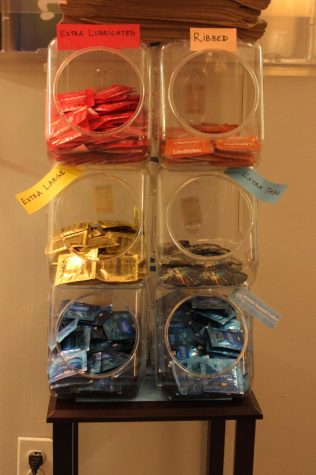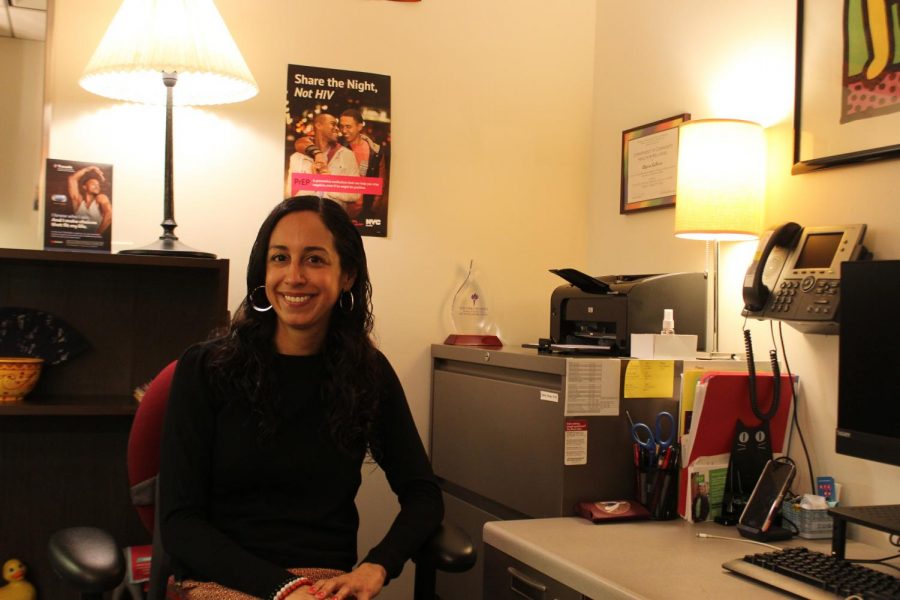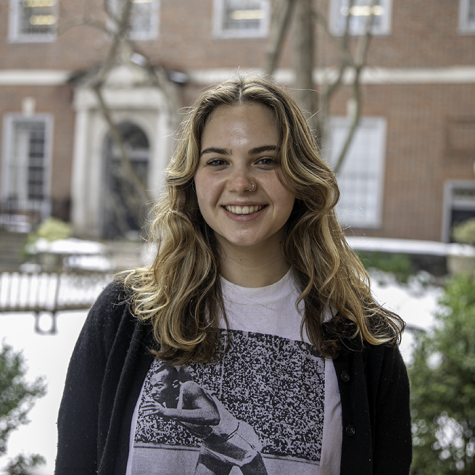Alyssa LaFosse says it’s okay to talk about sex
NYU’s Sexpert is here to talk about anything. Seriously, anything.
NYU’s Sexpert, Alyssa LaFosse, is a trained resource for students to consult about their sexual health. (Photo by Aleksandra Goldberg)
December 10, 2021
Behind the bright, clean doors of NYU’s Student Health Center primary care waiting area sits a small, cozy room — the office of resident HIV counselor and Sexpert, Alyssa LaFosse. The first thing you see is an assortment of condoms ranging from XS to XL, lubricated, ribbed and extra-thin. The wall is lined with pamphlets detailing what to do if you contract a sexually transmitted disease. The warm light and deep purples, blues and greens accenting the room match LaFosse’s gentle, soft-spoken demeanor. You feel comfortable the moment you walk in.
LaFosse earned her Masters of Public Health from the University of California, Berkeley. She worked in the university’s health center on a variety of issues including stress management, drug and alcohol education, eating disorders and sex education — her favorite topic to work with students on. When her contract ended in 2006, she left California, the only state she’d ever called home, and headed for New York City. She got a job working with youth who were experiencing homelessness to educate them on sexual health, but thought she’d go back to the Bay Area after a few years. A year later, she landed her dream job at NYU and has been here ever since.
LaFosse’s role as the resident Sexpert involves conducting sexual health counseling sessions with students, answering questions confidentially over email, and performing HIV and STD testing. In a given week, LaFosse sees 20 to 30 students in person or on Zoom and answers a handful of emails, sometimes offering referrals to other counselors or health practitioners depending on the situation. She also co-runs a six-week workshop every semester called Let’s Talk About Sex with NYU sexual health and relationship counselor Dr. Danielle Elleman.
Elleman said that although she has her own experience in the field, she has learned a lot while working with LaFosse. She pointed to a few of the Sexpert’s unique resources, most notably a life-sized comprehensive model of a clitoris.
“I’ve seen what a clitoris looks like,” said Elleman. “I’ve seen photos, but not a real-life model. It’s really fascinating. I’ve never seen it like that.”
LaFosse first became interested in comprehensive sexual health education after she graduated from her Catholic K-12 school and started her undergraduate degree at the University of California, Los Angeles. She realized there was a whole world she hadn’t been taught to navigate as the result of religious and cultural biases.
“I got very little sexual health education,” LaFosse said. “And what I did receive was abstinence-only and very anti-LGBTQ. I felt kind of robbed.”
Once she joined UCLA’s on-campus LGBTQ group, LaFosse realized how much she had to learn about healthy sex and the importance of having a thorough understanding of sexual education. It was then she knew that it was her passion.
“I didn’t want other young people to grow up like me and come to college not knowing anything,” she said.
LaFosse works to make sure all students know it’s okay for them to think about and prioritize sex. In an effort to combat the anti-LGBTQ sexual education often seen in the typical U.S. high school curriculum — as well as her own experience — she aims to be as inclusive as possible.
“I definitely make it a point for people to know I’m here to talk about everything,” LaFosse said. “All kinds of identities, all kinds of orientations, different kinds of sex.”

The most common problems LaFosse seeks to solve regard pleasure and communication. Many students come to her wondering why they can’t orgasm or get an erection — wanting to know what’s wrong with them. She assures students that their experiences are perfectly normal and that there is nothing wrong with them.
Her number-one recommendation is communication between partners, but a lot of students are unsure of how to do that.
“Socially, culturally, sex is everywhere, right?” LaFosse said. “But there aren’t really good models or representation for what communication around sex looks like.”
LaFosse explained how most sex scenes we see in movies or TV are a poor depiction of reality and often skip over communication entirely.
“People aren’t talking about what they like or what turns them on,” she said. “You just see people starting to do it.”
Another issue LaFosse has noticed is a lack of respect between partners.
“I see a lot of students who tell me they had a sexual experience that wasn’t positive for them,” LaFosse said. “They didn’t feel empowered to say to their partner that they weren’t enjoying something or that they wanted something. If you’re going to be intimate with someone, you should treat them with dignity and with respect, but that doesn’t always happen.”
There’s a real stigma when it comes to sex and intimacy, especially about communication surrounding sex.
“I think that there’s still this misconception that if you talk about it, then it becomes unsexy, awkward or you’re going to kill the moment or make things weird,” LaFosse said.
But the main thing that LaFosse wants people to know is that it won’t. She explained that the key to better sex is making sure both partners are on the same page and thoroughly understand one another.
“People should be having enjoyable sex,” LaFosse said. “It should be enjoyable for everyone involved, not just for one person.”
LaFosse’s primary goal is to help college students by giving them the best tools possible and by equipping them with the most comprehensive knowledge. Students often tell LaFosse that she is the first person they feel comfortable discussing these topics with. She acknowledged sex isn’t a major part of all students’ lives, but regardless, she wants them to know they have a space to talk about it and engage safely.
“I want to be there for them because maybe they don’t have a parent or some other trusted adult figure who they can go to with this,” LaFosse said. “I feel very humbled and privileged that students confide in me.”
To ask LaFosse a confidential question, NYU students can email her at [email protected]. Students can schedule a Zoom or in-person appointment with her via the NYU SHC portal.
Contact Aleksandra Goldberg at [email protected].

























































































































































